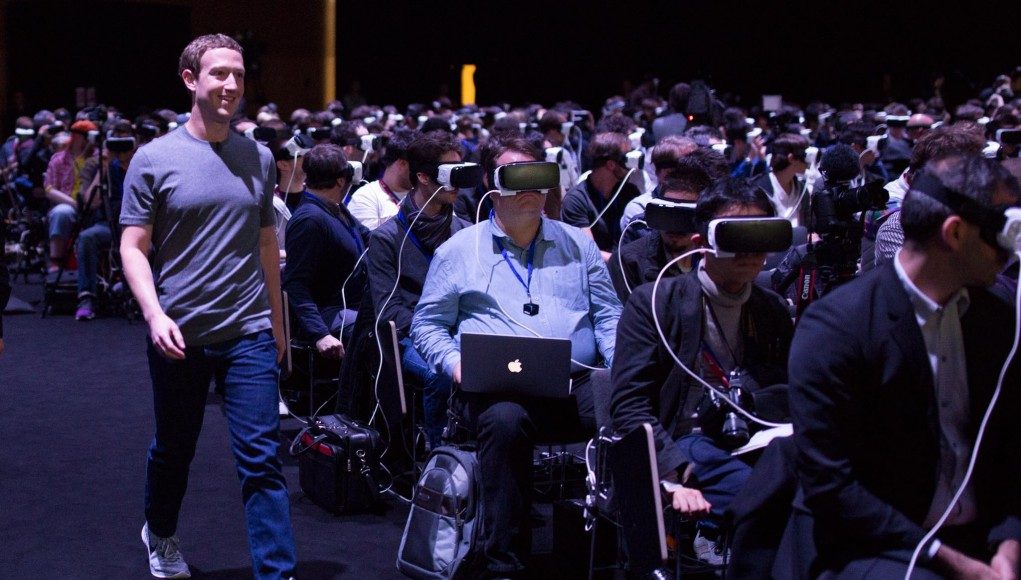A decade ago Zuckerberg made a $2 billion bet. XR was the future of computing, he wagered, and in buying a little known startup called Oculus, Meta would beat Apple to the punch.
An Unexpected Acquisition
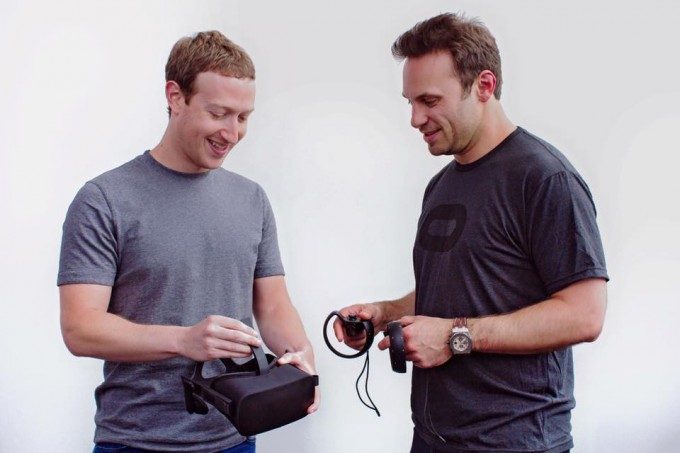
You can critique Meta CEO Mark Zuckerberg all you want, but you’ve gotta give the guy credit for playing the long game.
Ten years ago, long before Facebook became Meta, Zuckerberg reached the conclusion that XR was the future of computing and it was critically important for his company to beat Apple to the punch.
And he put his money where his mouth was by dropping more than $2 billion in 2014 to buy Oculus, a small startup that precipitated a grassroots resurgence of virtual reality technology.
At the time Meta was still known as Facebook, the social media company. Many heads turned in the tech industry when news of the Oculus acquisition broke. It wasn’t just that it was a pricey purchase, but what on Earth did Facebook want with a VR company?
To get a sense for how uncharacteristic the acquisition appeared for the company, my headline for the story read, “Not an Early April Fools Prank: Facebook Acquires Oculus VR Inc for $2 Billion.”
So what exactly did Zuckerberg see in Oculus? A way to outplay Apple.
A Way to Outplay Apple
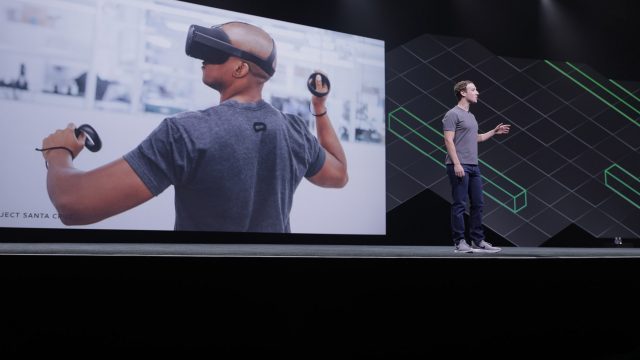
We came to learn that answer from a leaked email sent by Zuckerberg to Meta’s senior executives in 2015. The email laid bare his strategic thinking and how the Oculus acquisition was a long-term bet to outmaneuver Apple and Google, two companies that had a significant strategic advantage over Meta. Their control over iOS and Android—platforms where hundreds of millions of users accessed Facebook each day—gave them outside influence over the company.
Apple and Google held (and continue to hold) the keys to the smartphone castle. Zuckerberg was dead-set on not letting the same thing happen in XR, which he believed would become the next major computing platform.
“The strategic goal is the clearest. We are vulnerable on mobile to Google and Apple because they make major mobile platforms,” Zuckerberg said in the email to his executives. “We would like a stronger strategic position in the next wave of computing. We can achieve this only by building both a major platform as well as key apps.”
“From a timing perspective,” he went on to say, “we are better off the sooner the next platform becomes ubiquitous and the shorter the time we exist in a primarily mobile world dominated by Google and Apple. […] Therefore, our goal is not only to win in VR/AR, but also to accelerate its arrival. This is part of my rationale for acquiring companies and increasing investment in them sooner rather than waiting until later to de-risk them further. By accelerating this space, we are de-risking our vulnerability on mobile.”
With that, Zuckerberg and a portion of his company have spent the last decade trying to gain a strategic foothold in XR before Apple or Google could take a bite. The mission is so significant that in 2021 the company formerly known as Facebook completely rebranded itself to become Meta, a name reflecting Zuckerberg’s continued belief that XR and the ‘metaverse’ were the future.
Will Meta Succeed?
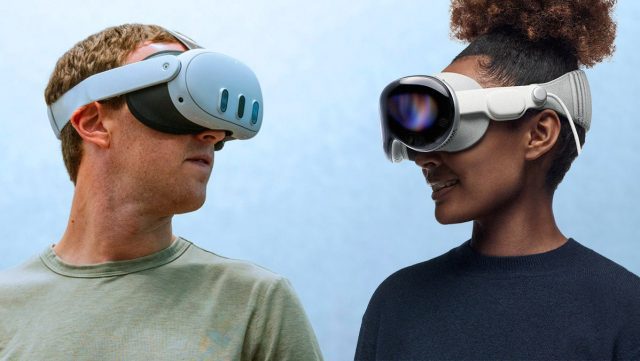
So here we are, ten years after Zuckerberg placed his $2 billion bet and declared his intention to become the ruler of XR. He’s since invested at least another $43.5 billion dollars building his XR castle.
Now along comes Apple waltzing up to the gates with a Vision Pro battering ram, ready to brawl over this new XR landscape (or perhaps ‘spatial computing’ landscape, if Apple has its way).
Who comes out on top?
It’s tempting to say that Meta has had a ten year head start thanks to Zuckerberg’s foresight. But the reality is that Apple has been actively doing R&D on XR for at least as long. In fact, we saw Apple hiring people with “VR/AR development” expertise in 2014, the same year Zuckerberg bought Oculus.
So what really happened is that Meta has been building its fortress out in the open, while Apple has been building in secret.
Meta’s gambit of building out in the open has allowed it to beat Apple to the punch by becoming the leading XR platform. Today Meta easily exerts control over the space by having the most accessible and affordable headsets combined with the strongest content library.
But beating Apple to the punch does not mean you’ve beaten Apple. To beat Apple you have to make a better product. And that’s hard to do.
We’re not going to pretend to know how the Meta-Apple brawl for XR territory is going to pan out. But it’s notable that the very thing which Zuckerberg was trying to upheave—Apple’s grip on a significant portion of the smartphone landscape—may be the thing that gives Apple the crucial advantage.
Not just because Vision Pro will run millions of existing iOS apps out of the box, but also because of the company’s ecosystem advantage which promises to make the headset play nicely with millions of Apple devices and existing services like FaceTime, iMessage, Siri, Apple Music, Apple TV, iCloud, and more.
Even without those things, Apple’s emphasis on user experience over raw tech is something that has made it the behemoth that it is today. Especially for a brand new category of product, establishing what a good user experience even looks like is key.
Meanwhile, after a decade of building XR products, underlying user experience issues are a recurring theme even as Meta consistently delivers some of the best and most affordable hardware on the market.
In the end, how will we know for sure if Zuckerberg succeeds in his decade-long quest? Well, the surefire way to know is if Meta never has to launch its own XR apps on Vision Pro. But if that does happen, Zuckerberg will be right back to where he started in the first place—under the thumb of Apple.
Does the Price Gap Matter in the Long Run?
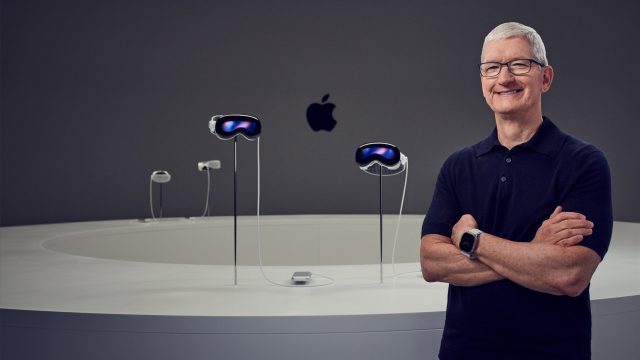
While the massive price gap between Vision Pro ($3,500) and Quest 3 ($500) certainly makes Meta’s headsets more accessible today, it’s clear that Apple wants to set a bar for quality first and then find out how to bring down the cost.
As these two titans square up for the battle over XR, I’m reminded of something said by Palmer Luckey, the founder of Oculus.
“[XR] will become something everyone wants before it becomes something everyone can afford.”
Ironically, Luckey was speaking about Oculus’ own products at the time. After being ousted from the company and watching from the outside as Meta tried to drive down the price of its headsets, he argued that even “free isn’t cheap enough” for XR to go mainstream. Price was irrelevant, he said, because Meta hadn’t built something that everyone truly wanted and lowering the cost wouldn’t make it so.
With Vision Pro launching at $3,500, Luckey’s thesis will finally be put to the test. Even if it costs that much, the question remains: has Apple built something that everyone really wants?
Who comes out on top? Let us know your thoughts in the comments below.

